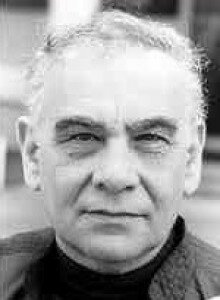
Aryeh Sivan’s poetry has been said to evoke a sense of shared public experience at the same time that it expresses provocation and protest. Sivan (né Bomstein) was born in Tel Aviv in 1929. He fought in Israel’s 1948 War of Independence as a member of the elite Palmach unit, then studied Hebrew language and literature at the Hebrew University of Jerusalem and worked as a high-school teacher until his retirement. He has published sixteen collections of poetry and a novel and is the recipient of several important awards, including the Brenner Prize (1989), the Bialik Prize (1998) and the prestigious Israel Prize for Poetry (2010). His work has been translated into seventeen languages.
One prominent characteristic of Sivan’s poetry is the use of proper nouns, a technique which leads to words standing – not only for the specific things they name – but for other things or ideas with which they are associated; in the language of linguistics, this associative device is called metonymy. As Natasha Saje points out in her essay, ‘Metonymy and the Insufficiency of Metaphor in Contemporary Poetry’, “The [metonymic poet] chooses one detail out of many [ . . . ] to represent the object or person just as a culture chooses which things are important by naming, producing, and reproducing them.” Saje warns us that “Highly metonymic poems are sometimes considered to be less poetic.” She cites as examples, “the diarylike poems of Frank O’Hara or Mark Halliday, anchored in particular time, place, and object. Relying less on image and metaphor and more on metonymy, they could almost be ‘journalism’, as Mark Strand once deprecatingly said about poems based in the real and every day.” However, Saje concludes, “industrialization and globalization have changed the world in ways that make the promise of universality a false one”, so that “poets who exploit the metonymic vitally acknowledge history”.
Her judgment beautifully applies to Sivan’s poems in this edition of PIW. There is usually a historic dimension to the body of work (fifty-eight poets from various eras) gathered here on the Israeli pages, given the long tradition of Hebrew poetry and the relatively short span of the Jewish state to date. Sivan’s poems get right to the point and the crux of the matter simply by naming “Jewish National Fund Avenue” in Tel Aviv: Jewish and national – the ongoing experiment and its resulting cultural/political/military reality. (In Hebrew, the name of the Zionist organisation is ‘Keren Kayemet’ – or ‘existence fund’. In the original language, the term works similarly but slightly differently, as it is clearly the existence of the Jewish state, and its nature, which are at issue, and not only the street named for the fundraising organisation.)
Sivan also alludes to a formative book for young people in the Palestine of his youth (in ‘Tel Aviv in the Early Forties’): Memories of the House of David, in the 1893–1900 Hebrew edition by A.S. Friedberg (Zikhronot le-Veit David) of Hermann Reckendorf’s Die Geheimnisse der Juden (5 vols., 1856–57), a fictionalised recounting of Jewish history intended to show that the line of David never disappeared. If we agree with Saje, metonymy forces us to think about history. “Unlike metaphor”, she notes, “metonymy shuns false certainties. It emphasizes process via the play of associations”. Read Sivan and see where the process takes you.
Bibliography
Poetry in Hebrew
Shirei Shirion (Poems of Armor), Achshav, Jerusalem, 1963
Arba ’im Panim (Forty Faces), Dar, Ramat Hasharon, 1969
Nofel Lecha Bifnim (Falling Inside), Sifriat Poalim, Tel Aviv, 1976
Ishrurim (Ratification), Sifriat Poalim, Tel Aviv, 1981
Lihiot Be-Eretz Israel (To Live in Eretz Israel), Am Oved, Tel Aviv, 1984
Hibukim (Poems 1986), Am Oved, Tel Aviv, 1986
Eretz Ma ’alah (Selected Poems), Hakibbutz Hameuchad, Tel Aviv, 1988
Kaf Ha-Kela (Hollow of the Sling), Hakibbutz Hameuchad, Tel Aviv, 1989
Gevulot Ha-Hol (Boundaries of Sand), Hakibbutz Hameuchad, Tel Aviv, 1994
Shirim (Poems), Tag, Tel Aviv, 1996
Dayar Lo Mugan (Unprotected Tenant), Hakibbutz Hameuchad, Tel Aviv, 1998
Selected Poems 1957–1997, Tel Aviv, Bialik Institute/Hakibbutz Hameuchad, 2001
Hashlama (New Poems), Keshev, Tel Aviv, 2002
Hozer Halila (Recurrence), Keshev, Tel Aviv, 2004
Kitoo-im (Amputees), Keshev, Tel Aviv, 2007
Al hol veh-al-yam (On Sand and Sea), Keshev, Tel Aviv, 2009
Fiction in Hebrew
Adonis (novel), Am Oved, Tel Aviv, 1992
In translation
German: S. Fischer, Frankfurt, 1994
Estonian: Eesti Raamat, Tallinn, 1997
Chinese: Baihuazhou, Nanchang, 2000
Links
A complete list of Sivan’s work, and works about him (in Hebrew)
A translation of ‘To Live in the Land of Israel’
Another translation of ‘To Live in the Land of Israel’
‘Today I’m Ready’
Five poems in translation
Sponsored by POETRY PLACE

